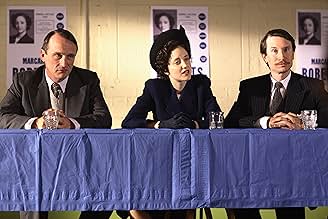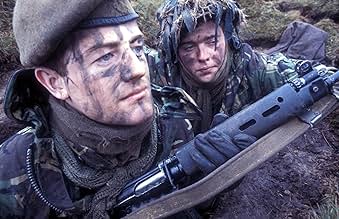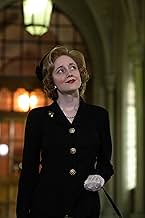अपनी भाषा में प्लॉट जोड़ेंOn April 2, 1982, Britain went to war to regain the Falkland Islands. This movie is a gripping account of how Prime Minister Rt Hon Margaret Thatcher MP's government handled the biggest cris... सभी पढ़ेंOn April 2, 1982, Britain went to war to regain the Falkland Islands. This movie is a gripping account of how Prime Minister Rt Hon Margaret Thatcher MP's government handled the biggest crisis in British foreign affairs since the Suez Canal. It tells the story of how Argentina, a... सभी पढ़ेंOn April 2, 1982, Britain went to war to regain the Falkland Islands. This movie is a gripping account of how Prime Minister Rt Hon Margaret Thatcher MP's government handled the biggest crisis in British foreign affairs since the Suez Canal. It tells the story of how Argentina, an ally of the British, fought the Conservative government and invaded the Falklands. This ... सभी पढ़ें
कहानी
क्या आपको पता है
- ट्रिवियाOriginally commissioned by the BBC in 1987, but wasn't filmed until 2002.
- गूफ़Admiral Lewin is wearing the South Atlantic Medal. Before the war had even begun.
- भाव
Alexander Haig: We are trying to de-escalise a war.
Margaret Thatcher: So am I. But you do not do it by appeasement. You increase its chances. You see this table? This was where Neville Chamberlain sat in 1938 when he spoke on the wireless about the Czechs as "far away people about whom we know nothing and with whom we have so little in common". Munich! Appeasement! A world war followed because of that irresponsible, woolly-minded, indecisive, slip-shod attitude and the deaths of 45 million people.
Tom Enders: The fact that we have to treat Britain and Argentina even-handedly for the purpose of negotiation...
Margaret Thatcher: How *dare* you treat us even-handedly? Argentina is the aggressor, the invader. A fourth-rate, cruel, unstable, corrupt, brutal regime with no morals or scruples whatever! They torture and murder their political opponents by the most ghastly Nazi methods. And this is the regime you wish to give even a foothold over British citizens?
- क्रेज़ी क्रेडिटThe first names of Nicholas Ridley and Jeanne Kirkpatrick were mis-spelled as Nicolas and Jeane in the closing credits.
- कनेक्शनFeatured in When TV Goes to War (2011)
Patricia Hodge was wonderful as "Maggie" and being a big fan of British TV and films many other faces were quite familiar. I was quite struck by how Rt Hon Francis Pym and members of the labor party has so quickly forgotten the lessons and cost of appeasement! At one point I would've loved to hear Mrs. Thatcher respond to those questioning the rightness of fighting over "some small rocks and a handful of people" with "If 1,800 British subjects are not worth fighting for, please tell me, exactly, what is the minimum number that IS? 5,000? 10,000? 100,000? 1,000,000?"
Besides having been there to listen to the daily coverage, I've watch a number of documentaries and read a number of books on the battle including the memoirs of the Battle Group Commander Adm. Sandy Woodward. Everything in this movie tracks closely with everything else that I know about the time, the situation and the battles. The one thing I would take exception with, frankly comes as no surprise to me. The all too familiar anti-American jealousy/prejudice that is very common in British programming. One need only contrast the carefully chosen flattering selection of Patricia Hodge to play Margaret Thatcher with the perhaps equally carefully chosen unflattering selection of Bob Sherman to play President Reagan. Not only did he bear no resemblance beyond an American accent, he played Reagan as a bumbling fool who couldn't even remember the name of the islands rather than the strong leader who helped bring down the Berlin wall and with it the Soviet Union. The most pathetic moment was portraying Reagan as having trouble deciding which tie to wear while discussing the issues. That was simply petty and mean.
Lost in all of this is the reality that the British government had allowed this crisis to develop through apathy, neglect and an unwillingness to sacrifice. The Argentine government was emboldened to act due to the steady decline of the power of the Royal Navy and in fact, had they the patience to simply wait a year or two more, the RN's only two carriers would've been decommissioned and Britain would've been forced to accept the take over of the islands. As it is, the losses of British shipping, especially that of the Sheffield and Coventry were reportedly contributed to a decision to cut costs on construction by reducing the length of the ships eliminating the space required for the anti-missile system they were originally designed to carry. This would seem to be a major deficiency for a ship supposedly designed for radar picket duty to detect and defend incoming missile attack! Oddly enough, another documentary I recently watched about the Eurofighter project disclosed similarly dangerous cost cutting which only proves that even those lessons written in blood are too soon forgotten!
- skyking-14
- 13 मार्च 2020
- परमालिंक

































